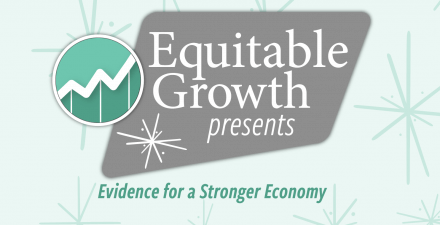Brad DeLong: Worthy reads on equitable growth, April 13-19, 2021
Worthy reads from Equitable Growth:
1. Susan Helper has plans for making outsourcing, offshoring, and other transformations that create very high-bandwidth links between firms in value chains win-win as opposed to win-lose: to have ringmaster firms find it more advantageous to partner with high-productivity firms to raise the surplus, rather than with firms able to find workers with little market power in order to redistribute the surplus. I think it will be very interesting and informative—well worth watching on May 3. Go to “Webinar: Transforming U.S. supply chains to create good jobs to learn how: “Large firms shifted from doing many activities in-house to buying goods and services from a complex web of other companies. Sometimes this restructuring can lead to innovation if supplier firms specialize in producing complex technologies or processes. But in other cases, firms outsource so they can offload production onto firms with weak bargaining power and thus little ability to compete except by aggressively holding down wages … [a] “low-road” mode … [whereas] high-road supply networks … benefit firms, workers, and consumers alike. High-road outsourcing, however, requires overcoming both market and network failures … [via] a set of policy proposals that directly address each of the reasons that outsourcing increases wage inequality.”
2. We economists often take too narrow a view of poverty and of societal well-being. Here Mark Rank provides an excellent remedy for that. And I think we at Equitable Growth are going to cross-examine him again soon. Read Alix Gould-Werth “In Conversation with Mark Rank,” in which they discuss: “How to usefully measure poverty in the United States. The actual causes of poverty. Poverty and race and ethnicity. Poverty and the broader U.S. macroeconomy. Myths about poverty and their consequences. Poverty and policymaking. Poverty and inequality in the United States.”
3. What my faction of economists thinks about the strong need for more public investment. Read Hilary Hoynes, Trevon Logan, Atif Mian, and William Spriggs, “More than 200 economists to Congress: Seize “historic opportunity to make long-overdue public investments” to boost economic growth” in which they argue: “Policymakers have an historic opportunity to make long-overdue public investments in physical and care infrastructure to boost economic growth and productivity. The share of our GDP invested in federally-funded research and development has fallen from around 2% in 1960 to just 0.6% today; this means less knowledge creation, fewer good jobs, and a harder time boosting employment in new sectors. Research—and common sense—tell us that this disinvestment is damaging for U.S. communities and our economy as older infrastructure depreciates and economic and social challenges go unaddressed … In addition to federal research, physical infrastructure needs must be addressed. The private sector alone is not capable of making the large-scale investments needed to address the overlapping structural challenges currently facing the country.”
Worthy reads not from Equitable Growth:
1. I really do not understand where and how those who are forecasting “overheating” in the U.S. economy over the next 12 months are getting their numbers for their estimates. Read my “I Do Not See “Overheating” This Year,” in which I write: “Yes, there will be some inflation—base effects and sectoral shifts and simply the speed of reopening will create bottlenecks in the system, and those with pricing power will take advantage. But—unless the coronavirus plague has done a lot more damage to the economic division of labor than I believe—it will not be because production and employment are in any manner above stable-inflation “potential.” Think of whatever inflation might happen as skid marks and burning rubber, rather than any form of boilover.”
2. The very smart Dan Wang on the complexities and contradictions of China in technology and organization, simultaneously more advanced and more retarded. Read “An interview with Dan Wang About China, the U.S., & Technology,” in which he observes: “China has become a lot more brutal … and … looks a lot more successful than I expected … things … getting worse, and … things … getting better, just depend[ing] on the particular segment … China is the world’s best place to manufacture so many different types of goods and they’re more or less doubling down a lot more on China as a major market and also as a producer … There are some areas of Chinese technological success, I would cite areas like solar panels, high-speed rail, mobile telephony equipment, so this is the 5G stuff that Huawei has become really good at. But if you take a look at a much bigger ticket items, things like semiconductors or aviation technologies, China has been a manifest failure.”
3. The extent to which the technocrats of the Trump administration failed to understand the difference between the structure of the world economy and the shadows cast by various forms of tax arbitrage is absolutely stunning. Never mind that the policies would not have been very likely to be successful if the world had been as they thought it. The world was simply not as they thought it was. Read Paul Krugman, “Why Was Trump’s Signature Policy Such a Flop?,” in which he writes: “The Tax Cuts and Jobs Act ended up having no visible effect at all on business investment …The corporate profits tax isn’t a tax on capital, it’s a tax on a particular aspect of corporate financial structure … Business investment isn’t that sensitive to the cost of capital, anyway … Corporations … [did not] move capital and jobs to lower-tax nations … it didn’t reverse capital flight because the capital flight never happened in the first place …The U.S. government gave up hundreds of billions of dollars to fix a nonexistent problem.”
4. It was very strange, the Obama administration. So many people who were very interested in accomplishing technocratic long-run policy goals, but not in doing the foundation work to make those accomplishments durable. Progress on rebalancing federal finances melted away the moment his second term ended, the Affordable Care Act barely survived, and those were the two most notable accomplishments. The Biden people seem aimed at a better reinforcing structure of policy, political credit, and societal support. Listen to Ezra Klein’s podcast, “The Best Explanation of Biden’s Thinking I’ve Heard,” in which he speaks with Brian Deese, the director of the National Economic Council: “I asked Deese to join me on the podcast to talk about how his economic policymaking and thinking have changed since 2009.”




